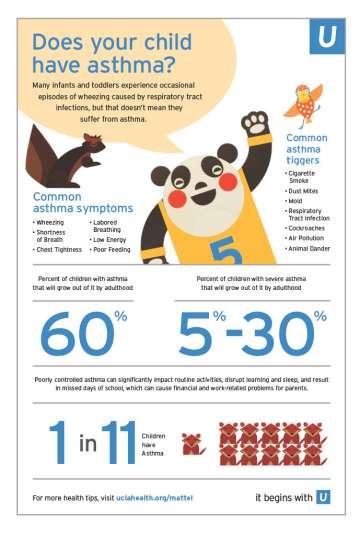Asthma Program
Find your care
Our pediatric pulmonologists customize every treatment based on your child’s needs. Call 310-825-0867 to connect with an expert.
The Pediatric Asthma Program at UCLA Mattel Children's Hospital provides comprehensive and individualized diagnosis and treatment for infants, children and adolescents suffering from asthma. Asthma is a chronic lung disease that inflames and narrows a child's airways. Asthma causes recurring periods of wheezing, chest tightness, shortness of breath, and coughing. Approximately 7 million children in the United States are affected with asthma.
Our pediatric pulmonologists are experts in the diagnosis and management of asthma in infants, children and adolescents. We have access to the most advanced technologies and therapies and our program takes a multidisciplinary approach to treating asthma. Our dynamic team includes a range of pediatric specialists as well as social workers, nurses, dietitians, and respiratory therapists who will offer support and education to patients and their families. As a result, we have the resources and skills to create a treatment plan specific to your child's needs. We are committed to helping children manage their asthma and to further allow children to participate in a healthy and active lifestyle.

Some of the services our program offers are as follows:
- Consultative diagnosis and management of disease impacting normal respiratory function
- Inhalation challenge testing
- Bronchoscopy
- Pulmonary function testing
- Exhaled nitric oxide testing
- Allergy testing
- Inhaler device training
- Exercise testing
- Dedicated teaching from a certified asthma specialist and/or dedicated respiratory therapist
Our Medical Team
Contact Us
Appointments & Referrals - Phone: (310) 825-0867
Administrative Office & Information - Phone: (310) 825-5930
Administrative Office - Fax: (310) 794-7338
Pulmonary Nurse Specialist, Asthma Educator - Elaine Harrington, RN, BSN, AE-C - Phone: (310) 267-0606
Email: [email protected]
Does my child have asthma?
Many infants and toddlers experience occasional episodes of wheezing caused by respiratory tract infections, but that doesn’t mean they suffer from asthma, a chronic disorder that causes swelling and inflammation of the airways.
Risk factors, including a family history of parental or sibling asthma, eczema and food allergies can increase a child’s risk to develop asthma. About 60 percent of children with asthma will grow out of it by adulthood. However, only 5 to 30 percent of children with severe asthma will outgrow their asthma by adulthood.
“If you suspect your child has asthma, you should bring your child to your pediatrician for an evaluation,” says June Liu, MD, a pediatrician with the UCLA’s West Los Angeles Pediatrics
office. “The types of medicines or treatments that are recommended depend on the severity of asthma — intermittent or persistent mild, moderate or severe — so it’s important to have close follow-up with your pediatrician.” Infants and children with asthma are at risks for asthma episodes, which can be dangerous. In addition to wheezing, other important signs and symptoms to look out for include shortness of breath, chest tightness, labored breathing, low energy, and poor feeding. If your child has these symptoms, they should be urgently evaluated.
Physicians typically diagnose asthma by looking at the frequency and timing of episodes, the presence of risk factors and a child’s response to medication, Dr. Liu says. These factors will determine how it is treated. When allergies are suspected, try to avoid common environmental triggers.
New Approach to Treating Children’s Asthma
Asthma is a chronic lung disease that, in young children, is often triggered by the common cold or other respiratory-tract infections. Traditionally, children with mildto-moderate asthma are often prescribed anti-inflammatory drugs that must be taken orally or through an inhaler daily for several weeks or months to reduce asthma-related problems. For some of these children, a new treatment regimen may effectively control their asthma symptoms in less time.
“It’s not a new drug,” says Sande Okelo, MD, PhD, a pediatric pulmonologist at UCLA. “It’s a new way of using a traditional asthma medicine.”
The medicine, budesonide, decreases the number and severity of asthma attacks by reducing swelling and mucus production in the airways. The standard approach is for patients to take a daily, low-dose regimen of the drug (0.5 mg nightly) over an extended period of time to prevent asthma flare-ups after the onset of cold symptoms. A recent study, however, demonstrated that a twice-daily regimen of 1 mg taken over seven days only at the time of a cold was equally effective at reducing symptoms in children younger than 5 years of age.
“The majority of young children with asthma only have problems when they get a cold,” Dr. Okelo explains. “This new treatment approach may be very appealing to the parents of those youngsters because they will no longer have to keep up with giving their toddlers asthma medications every day for months on end.” Read more



